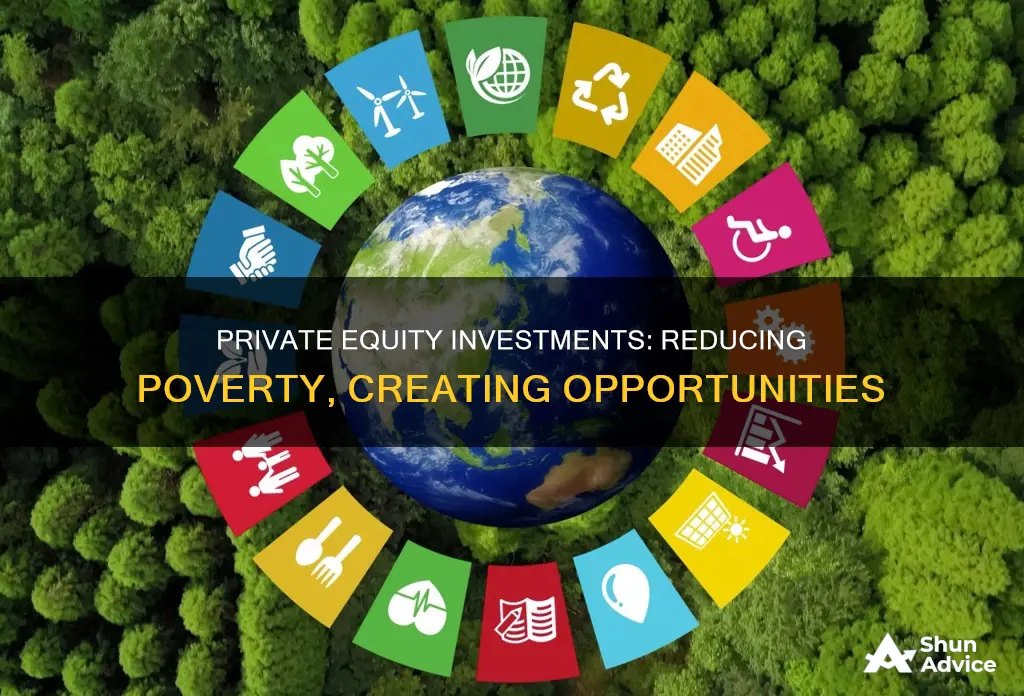
Private equity investment has the potential to curb poverty, but it is not a cure-all solution. Private equity firms buy and manage companies, aiming to increase their value before selling them for a profit. This process can involve overhauling the acquired company, making operational and financial changes, and pursuing initiatives such as developing an e-commerce strategy or entering new markets. While this can create value for investors and improve the acquired company, it may also lead to rapid changes that are difficult for employees and communities. The success of private equity investments in reducing poverty depends on various factors, including the skills and objectives of the firm, the business environment, and the interaction between risk tolerance and entrepreneurial psychology. To effectively curb poverty, a combination of strategies is necessary, including public and private investment in physical infrastructure, human capital, and pro-poor spending that specifically benefits disadvantaged communities.
| Characteristics | Values |
|---|---|
| Private equity investment in infrastructure | Can combat current and future poverty |
| Amount of private infrastructure investment in the world's poorest countries between 2010 and 2019 | $6 billion |
| Total amount of private infrastructure investment during the same period | $1.1 trillion |
| Private sector investment focus | Local food markets, working with producer organisations, respecting the rights of small-scale producers, workers and communities |
| Private equity investment type | Buyouts, secondary buyouts, carve-outs, venture capital, distressed investing, growth equity, sector specialists |
| Private equity firm example | Bamboo Capital Partners |
What You'll Learn

Investing in infrastructure projects in low-income countries
Infrastructure investment is a powerful tool in the fight against poverty. It can not only alleviate poverty in the present but also help prevent it in the future. However, the poorest countries have received only a tiny fraction of private infrastructure investment globally. This essay will discuss how private equity investment can be directed towards infrastructure projects in low-income countries, exploring strategies, considerations, and potential benefits.
Strategies for Private Equity Investment
To attract private equity investment to infrastructure projects in low-income countries, several strategies can be employed:
- Staging: Private equity firms can commit capital in phases based on the project's progress, allowing them to monitor performance and mitigate risks.
- Syndication: Partnering with other investors helps share risks and expertise.
- Government Collaboration: Collaboration with governments and development agencies can mitigate political and regulatory uncertainties and underdeveloped legal frameworks.
- Tax Incentives: Tax incentives and guarantees from governments can make projects more financially viable and attractive to investors.
- Robust Regulatory Frameworks: Transparent and fair regulatory frameworks are essential for attracting long-term private equity involvement.
Benefits of Private Equity Investment in Infrastructure
Private equity investment in infrastructure projects in low-income countries offers several advantages:
- Long-term Stable Returns: Infrastructure projects offer the potential for long-term, stable returns, backed by essential assets and predictable cash flows.
- Risk Mitigation: Private equity firms can help share project risks among a larger group of investors, reducing individual sponsors' risks.
- Expertise and Innovation: Private equity firms bring expertise in managing complex projects, and they often introduce modern technologies and effective risk reduction strategies.
- Addressing Funding Gaps: Private equity investment can help bridge the significant funding gaps in infrastructure development faced by low-income countries.
- Environmental Sustainability: Private equity investment in sustainable infrastructure, such as renewable energy and energy efficiency projects, can drive economic growth and contribute to environmental goals.
Challenges and Considerations
When venturing into infrastructure investment in low-income countries, private equity firms should consider the following challenges and considerations:
- Political and Regulatory Uncertainties: Unstable political environments and underdeveloped legal frameworks can deter investment.
- Adverse Business Environment: High costs of doing business and a weak business environment can hinder the impact of investment on poverty reduction.
- Project Complexity: Infrastructure projects are inherently complex, requiring large upfront investments and extended timelines.
- Specialized Expertise: Navigating the complexities of sustainable infrastructure projects may require private equity firms to develop additional expertise or collaborate with specialized partners.
- Longer Investment Horizons: Green infrastructure projects may necessitate longer investment horizons due to higher upfront costs.
Highlighting Investment Portfolio on Resume: Pros and Cons
You may want to see also

Investing in physical infrastructure and human capital
Private equity investment has the potential to curb poverty by investing in physical infrastructure and human capital. This involves providing funding for projects such as roads, bridges, and schools that directly benefit impoverished communities. It also includes investing in skills training and education to help individuals escape the cycle of poverty.
Physical Infrastructure
Private equity investment in physical infrastructure is crucial for economic development and can play a significant role in poverty reduction. This includes investments in transportation networks, such as roads, bridges, and public transportation, which improve mobility and connectivity for people and goods. Additionally, investments in essential infrastructure like water treatment facilities, power plants, and communication networks can have a transformative impact on communities, improving access to basic services and creating a foundation for economic growth.
For example, private equity firms may invest in renewable energy projects, such as solar or wind farms, which can provide clean and affordable energy to underserved areas. They can also invest in the development of physical infrastructure in the healthcare sector, such as building or upgrading hospitals, clinics, and medical research facilities, ensuring that communities have access to quality healthcare services.
Human Capital
Investing in human capital is equally important in curbing poverty. Private equity firms can contribute by funding educational programs, vocational training, and skills development initiatives. This enables individuals to acquire the knowledge and skills necessary to secure better-paying jobs, start their own businesses, or improve their existing livelihoods.
For instance, private equity investment in early childhood education and development programs can help ensure that children from low-income families have access to quality education and resources, setting them on a path towards a brighter future. Similarly, investments in vocational training programs can provide young adults with marketable skills, making them more employable and improving their economic prospects.
Benefits of Private Equity Investment
Private equity investment in physical infrastructure and human capital offers several advantages. Firstly, it can help create jobs, both directly through construction and development projects and indirectly by stimulating economic activity. Secondly, it empowers individuals with the skills and resources needed to lift themselves out of poverty, reducing their dependence on public sector support. Lastly, it can induce further domestic and foreign investment by demonstrating a commitment to the region's development and showcasing its potential.
However, it is important to note that private equity investment alone may not be sufficient to curb poverty. It should be complemented by a favourable business environment, including stable political conditions, clear property rights, and a supportive regulatory framework. Additionally, investments should be made with a long-term perspective, focusing on sustainable solutions rather than quick fixes.
In conclusion, private equity investment in physical infrastructure and human capital can play a pivotal role in curbing poverty. By investing in essential infrastructure and human capital development, private equity firms can make a significant social impact while also generating financial returns.
Investing in Apollo Global Management: A Comprehensive Guide
You may want to see also

Investing in mature companies
Private equity firms often invest in mature companies that are already established. These companies may be deteriorating or failing to make the profits they should due to inefficiency. Private equity firms buy these companies and streamline operations to increase revenues.
Private equity firms usually seek to buy 100% ownership of the companies they invest in, giving them total control. They tend to concentrate all their efforts on a single company since they invest in already established and mature companies. The chances of absolute losses from such an investment are minimal.
Private equity firms can buy companies from any industry, whereas venture capital firms tend to focus on startups in technology, biotechnology, and clean technology. Private equity firms also use both cash and debt in their investment, whereas venture capital firms deal with equity only.
Private equity firms have a range of investment preferences. Some are strict financiers or passive investors wholly dependent on management to grow the company and generate returns. Because sellers typically see this as a commoditized approach, other private equity firms consider themselves active investors. That is, they provide operational support to management to help build and grow a better company.
Active private equity firms may have an extensive contact list and C-level relationships, such as CEOs and chief financial officers within a given industry, which can help increase revenue. They might also be experts in realizing operational efficiencies and synergies. If an investor can bring in something special to a deal that will enhance the company's value over time, they are more likely to be viewed favorably by sellers.
Private equity firms are driven by the goal of maximizing returns for their investors. This overarching goal, however, means using strategies that can have wider effects on different communities, some of which have garnered critical attention.
A key way to maximize returns is to increase the profitability and value of portfolio companies. This is often achieved by implementing operational improvements, expanding market reach, or innovating products and services. Private equity firms may also take more aggressive approaches that commonly include the following:
- Asset liquidation: Selling off assets or parts of the business to streamline operations or generate immediate cash flow.
- Cost reduction: Implementing stringent cost-cutting measures, which can lead to significant layoffs or downsizing.
- Imposing debt: Acquiring companies primarily through debt, which is later repaid using the company's cash flow or by selling its assets. This can put considerable financial pressure on the company.
These strategies can lead to substantial financial gains for investors but may also result in negative outcomes elsewhere, such as job losses or reduced investment in the company's long-term growth or vision.
Devising an Investment Portfolio: Strategies for Success
You may want to see also

Investing in struggling companies
Private equity firms may also provide operational support to management, helping to build and grow a better company. They can assist in realising operational efficiencies and synergies, and their extensive contact lists and C-level relationships can help to increase revenue.
However, private equity firms often carry out drastic cost-cutting measures, such as layoffs and reductions in worker benefits, which can have a detrimental impact on employees and local communities. They also frequently use leveraged buyouts, which can saddle companies with unsustainable debt and increase the risk of future bankruptcies.
When investing in a struggling company, it is essential to research thoroughly and negotiate an exit strategy upfront. Private businesses often struggle to access capital, making private investment an attractive funding option. As an investor, you can choose between passive involvement or active management roles, depending on your investment level.
It is worth noting that private equity investments are usually only available to accredited investors or high-net-worth individuals due to the high capital requirements.
Angel Investing in India: A Beginner's Guide
You may want to see also

Investing in expanding companies
Private equity investments can be a powerful tool for curbing poverty and promoting economic development, especially when directed towards expanding companies. Here's how investing in expanding companies can contribute to poverty reduction:
- Job Creation and Employment Opportunities
- Economic Growth and Poverty Reduction
Economic growth and poverty reduction go hand in hand. When private equity investments are made in expanding companies, it stimulates economic activity and contributes to the overall growth of the economy. This growth has a multiplier effect, where increased economic activity leads to more investments, which further drives growth. A thriving economy can attract additional investments, creating a virtuous cycle that benefits a wide range of stakeholders, including those living in poverty.
Infrastructure Development and Community Benefits
Expanding companies often require physical infrastructure, such as buildings, transportation networks, and utilities. Private equity investments in these companies can indirectly contribute to the development of local infrastructure. Well-developed infrastructure has a positive impact on the surrounding communities, improving access to essential services, enhancing living conditions, and creating a more conducive environment for businesses to thrive. This, in turn, can attract further investments and promote sustainable development.
- Skills Development and Empowerment
- Inducing Further Investments
Private equity investments in expanding companies can induce further investments from both domestic and foreign investors. As expanding companies demonstrate profitability and growth potential, they become more attractive investment prospects. This can lead to a snowball effect, with initial private equity investments catalysing additional investments from other sources. This influx of capital can have a positive impact on poverty reduction by creating more jobs, stimulating economic growth, and providing much-needed resources for community development.
In conclusion, investing in expanding companies through private equity can play a significant role in curbing poverty. It achieves this by creating employment opportunities, stimulating economic growth, contributing to infrastructure development, empowering individuals through skills development, and inducing further investments. However, it is essential to ensure that these investments are directed towards regions and sectors where they can have the greatest impact on poverty reduction and promote inclusive and sustainable development.
Understanding Pips: Portfolio Investment Strategy Basics
You may want to see also
Frequently asked questions
Private equity investment can curb poverty by providing capital to businesses and industries that positively impact impoverished communities. This can include investments in infrastructure, agriculture, and other sectors that create jobs and improve living conditions for people in low-income areas.
Private equity investment has the potential to create long-term positive change by providing much-needed capital to underserved communities. It can also help develop local businesses and create sustainable economic growth, reducing the need for external aid and philanthropy.
Yes, there are risks and challenges. Private equity investments may not always align with the long-term interests of the communities they invest in. There may be concerns about unsustainable debt, rapid changes to businesses, and potential negative impacts on employees and communities. Additionally, private equity investments often require significant capital commitments, limiting access to only high-net-worth individuals and institutions.
To be more effective, private equity investment should focus on local communities and adhere to key principles such as respecting the rights of small-scale producers, workers, and communities. It is also important to ensure adequate regulation and a favourable business environment to maximise the positive impact of investments on poverty reduction.







